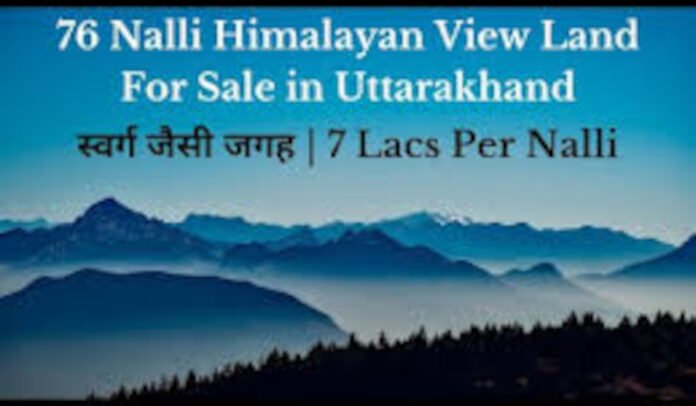The silence that hangs over the mountains of Uttarakhand is not the sacred quietude of the Himalayas; it is a heavy, unnatural hush. It is the sound of villages slowly emptying, of a civilisation that has thrived here for centuries unravelling at its seams. From afar, the empty houses and overgrown orchards may look like a mystery. Up close, the truth is heartbreakingly clear: families are selling their ancestral land, often the only asset they possess, and resettling in the plains.
This is not a sudden calamity but a gradual, relentless exodus. Parcel by parcel, terrace by terrace, the very soul of these hills is being transferred to outsiders with money. The decision is rarely taken lightly, but increasingly it is seen as the only way out of an existence that has become untenable.
Farming No Longer Feeds the Future
For generations, mountain life revolved around agriculture. Families cultivated apples, plums, apricots and grains with a devotion that was as much spiritual as it was economic. Yet today, agriculture is no longer viable. Traditional apple varieties, once the pride of hill farmers, are small, irregular and cannot compete with the uniform, glossy produce from Himachal Pradesh that dominates markets. Even when tended with immense care, returns are meagre. Farming these steep, unforgiving slopes is physically exhausting, and the back-breaking effort rarely translates into profit.
This year, a hailstorm struck while the fruits were still young, bruising entire orchards in a single night. Farmers who had laboured for months stood helpless as the ground was littered with damaged fruit that fetched a fraction of its usual price. It was a cruel blow, made worse by the knowledge that such unseasonal weather is now the norm rather than the exception.
Climate: From Ally to Adversary
Once, farmers could predict the rhythm of the seasons. Now, climate change has turned the weather into a foe. Unseasonal rains during flowering, hailstorms during fruiting, prolonged dry spells and sudden downpours have made cultivation a gamble. The warming climate also accelerates spoilage. Fruits that used to stay firm now wither quickly in the heat. Without proper cold storage facilities—almost non-existent in most hill districts—farmers are left with rotting harvests within days. A year’s labour can be wiped out not by pests or negligence, but by the twin forces of global warming and infrastructural neglect.
Organic Produce, No Organic Profits
Ironically, most mountain farmers still avoid chemicals and pesticides, their produce being essentially organic. Yet they gain nothing from this virtue. There is no systematic certification or marketing channel in place for them. The farmers know they are producing organic yield, but do not know how to access the official labels that the Government of India recognises, such as the Participatory Guarantee System (PGS) or the National Programme for Organic Production (NPOP). Without these certifications, they cannot legally sell under the organic tag.
In sharp contrast, companies and retailers adept at navigating these bureaucratic processes and branding rules are making huge profits by attaching the organic label to their products. The very farmers who grow food without chemicals are sidelined from the premium market, while middlemen and corporates benefit disproportionately.
Roads, Markets and the Spoiled Harvest

The mountains themselves conspire against farmers in another way: logistics. Narrow, winding roads and poor connectivity make it expensive to transport produce to plains markets. By the time fruit reaches mandis, a large share is already spoiled. The lack of cold chains and modern storage means that farmers are forced to sell quickly, often at throwaway prices. The promise of direct market access remains largely unfulfilled. A few cooperatives have tried to bridge the gap, but most farmers still rely on middlemen who exploit their desperation.
The Vanishing Allure of the Army
For decades, one steady anchor kept youth tied to their villages—the Army. A career in the armed forces brought prestige, stable employment and a pension that supported families for generations. But the introduction of the Agniveer scheme, with its four-year contracts and no pension, has stripped away that allure. Young men now view the Army not as a calling but as a temporary stint. With few other local opportunities, they are increasingly disillusioned. Instead of protecting the nation from the mountains, they choose to abandon the mountains altogether.
Smartphones, Social Media and Aspirations
In earlier times, young people compared their lives only with their neighbours’. Now, with smartphones and social media, they compare them with glossy images of metropolitan life. On Instagram and YouTube, they see peers with access to modern schools, shopping centres and secure jobs. Their own existence—labouring on fields, waiting for the weather’s mercy—appears outdated and futile.
Parents, too, are swayed. They want their children educated in private schools in Dehradun, Rishikesh or Delhi, speaking fluent English and pursuing professional careers. The limited resources of mountain schools cannot compete. To secure their children’s future, families make the ultimate sacrifice: selling their ancestral land.
The Lure of Easy Money
The land, once sacred, is now the ultimate escape. Selling is surprisingly simple: a deed, a signature, and a family goes from financial anxiety to being crorepatis overnight. They keep a token plot with a modest home in the hills, but the bulk of their holdings are sold. The proceeds build larger, modern houses in the plains, often rented out to generate stable, effortless income. For many, this transformation is irresistible. Why toil in uncertain orchards when a single sale guarantees security and comfort for the next generation?
Government Interventions: Drops in an Ocean
The government should be doing far more to stem this tide. It should be introducing better fruit varieties, systematically helping farmers to find ways of removing senile orchards without losing their annual aernings, providing mobile cold storage during harvests, opening direct market channels to bypass exploitative middlemen, and expanding fruit processing centres where farmers can learn to make jams, chutneys, juices and squashes. From my own orchard, I once produced sixty kilograms of jams and chutneys, a minuscule amount, but even that demonstrated how value addition could boost income. Farmers with larger holdings could do far more if they had support and training. Another promising avenue is the introduction of a controlled fruit wine industry, similar to Himachal Pradesh, which has provided both employment and profit. Whether these measures are being implemented consistently or not, the point is that they must be taken seriously if the exodus from the hills is to be slowed. Without robust intervention, these initiatives remain isolated experiments rather than systemic solutions.
The Weight of Futility
And yet, for most farmers, these initiatives feel like drops in a widening ocean. Against the scale of climate change, market inefficiencies and social aspirations, such interventions cannot compete. The story of this year’s hailstorm illustrates the futility. Orchards of organic apples, cultivated with painstaking labour, were devastated in hours. The organic label carried no premium in the market. Farmers saw their fruit treated as second-grade while imported, wax-polished varieties fetched high prices. How long can anyone endure such indignity?
The Exodus and Its Aftermath
Thus the exodus continues. Families move to the plains, taking with them not just their children but their traditions. Entire villages are hollowed out. Abandoned houses crumble, fields lie fallow, and ancient rhythms fall silent. Those who return do so briefly, during summer holidays, to the smaller homes they retained. The hills become retreats, not homelands. The very identity of Uttarakhand as a land of sturdy mountain folk is giving way to absentee landlords and outsider buyers.
A Vanishing Way of Life
The government may promote tourism and homestays, but without people rooted in the soil, what remains to welcome the visitor? The mountains risk becoming postcard landscapes—beautiful but hollow. The heart of Uttarakhand is being sold, not through invasion or calamity, but through the collective decision of its people, who see no other path. It is a rational choice born of desperation. But it is also the slow, steady unmaking of a civilisation.
The unanswered question remains: when the soul of the mountains is sold plot by plot, can it ever be recovered? Or will Devbhoomi become merely a commodity, stripped of the very people who gave it meaning?





















